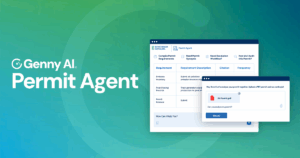The integration of AI technology into environmental, health, and safety (EHS) and sustainability functions has been a growing trend in recent years. To gain insights into this evolving landscape, Benchmark Gensuite recently hosted a panel discussion featuring three industry leaders who have been actively leveraging AI solutions in their organizations.
Molly Hopper, the Global EHS Compliance Assurance and Digital Technology Leader at GE Appliances, Haier, shared her company’s experiences with AI implementation. “In the beginning … there was this fear? You know, like it’s spying on us. It’s going to use our data,” Hopper said, highlighting the initial hesitation around AI adoption.
Hopper explained that GE Appliances has been focused on using AI to improve their incident and injury management processes, leveraging solutions like Benchmark Gensuite’s Describe It AI to enhance the quality of data input.
“One of the issues that we’ve had is that we don’t always have good data going into our cases. So, it’s been hard to get good data out and know how to improve. Incorporating the Describe It function has really been a huge benefit to us because it’s really driving that thought process of non-EHS professionals so we can put more quality information in the system. And get more quality information out for our continuous improvement activities.
From an accuracy standpoint … I think that’s more important than saving time. You know, we are EHS professionals … we protect people, the environment, and we manage risk. A lot of those things are only as good as your data or the accuracy that you get out of it. You don’t want to make a decision that could have a catastrophic outcome based on potentially inaccurate data. So, we are starting small with AI and we haven’t gotten to a larger scale yet. But we are perfecting it so that we can expand.”
Striking the Right Balance: Leveraging AI as an Assistive Tool for EHS and Sustainability Expertise
Throughout the discussion, the panelists emphasized balancing the capabilities of AI with the expertise and oversight of EHS and sustainability professionals. They highlighted the need to view these tools as assistants rather than replacements for human decision-making.
Rob Somers, the Senior Director of EHS at Perrigo, echoed the importance of context and understanding when it comes to AI. ” You can’t replace the contact between the EHS professionals and the teams doing the work. Context matters. People will always be needed. So we always have to understand this is a tool to help us be more efficient. It’s something to get you going in the right direction.”
He added that AI is a tool to help EHS professionals focus their efforts on the most critical risks and incidents, rather than trying to address every single event. Risk AI Advisor has been very helpful in that capacity, as it’s equipped the organization to focus on events that have the most potential to result in a significant incident.
“We have EHS professionals all over the world identifying and fixing risks. But it’s very, very challenging to get to everything. [Risk AI] helps us narrow our focus instead of boiling the ocean. We’re all strained on resources to be able to do all the things on our plate and anything that helps us have more time, more focus, and improve the outputs of what we do is a bonus.”
Building Confidence in AI-Driven Insights for EHS and Sustainability
Marianne Pollard, the Director of EHS, Security and Sustainability at the Boston Beer Company, shared her organization’s experience with using Benchmark Gensuite’s Risk AI and Ergo AI Advisors. “There was just a lot of excitement for the tools. Our chief supply chain officer said he was so excited because this was going to be the supply chain’s first entree into AI and the EHS team was delivering it,” Pollard recounted. However, like Hopper, she also noted the initial challenge of building confidence in the data and interpretations provided by the AI system.
“Our biggest challenge early on was building believability in what the data was telling us. To be honest, it’s still a little bit of a struggle, but, but it certainly gets better every day as we interact with the content. [With Risk AI Advisor], the summaries do that first round of initial thinking. We have begun to see a correlation between our Good Catch, Injuries, and Events … This is what gets at the believability aspect.
We’re not sitting there spending time trying to interpret and read lines and lines of an Excel spreadsheet. We can get this key interpretation, think about it, and validate it if it doesn’t vet with our direct experience. But it’s saving us that initial time of interpretation.”
Connecting Human and Aritifical Intelligence: Benchmark Gensuite’s Approach to AI for EHS and Sustainability
In addition to this deep dive of organizations’ experiences with piloting AI solutions within their programs, the panel also explored how AI can enhance risk assessment and identification processes, streamline data management and reporting, and enable more efficient and effective EHS and sustainability initiatives. Benchmark Gensuite’s own AI solutions, such as optimal character recognition (OCR) and image analysis capabilities for extracting information from PDFs and images, as well as analyzing and interpreting images for faster decision-making, were showcased as examples of how organizations can leverage these technologies to drive improvements in their operations.
R. Mukund, the Founder and CEO of Benchmark Gensuite, provided additional context on the company’s approach to AI, which aims to strike a balance between automation and human oversight. He explained the company’s ongoing initiative to develop “fit for purpose” AI models specialized to EHS and sustainability subject matter. He provided several examples to illustrate this concept, including using AI to summarize contractor safety documentation for pre-qualification purposes. Mukund noted that AI trained on the data and requirements relevant to that process could reduce manual effort by 75-80%. He also shared use cases of leveraging AI to digitize inspection checklists and convert disclosure information requests. Mukund explained that by training the AI on the specific formats and data needed for these EHS tasks, it can automate routine work and allow EHS professionals to focus on higher-value activities.
Mukund contrasted fit for purpose models with the limitations of more broadly trained AI tools, which may not have the necessary context and domain-specific knowledge to perform EHS and sustainability tasks effectively. He stressed that the goal is not necessarily full autonomy, but rather empowering EHS professionals with AI-powered tools that are properly guided and trained to complement their expertise.
As the adoption of AI continues to grow in the EHS and sustainability space, it will be crucial for organizations to navigate the challenges and opportunities presented by this technology. By learning from the experiences of industry leaders and staying informed on the latest advancements, EHS and sustainability professionals can better navigate the path forward and position their teams for success in the era of AI-powered solutions.
Interested in beginning your journey with AI? The Benchmark Gensuite team would be delighted to continue the conversation with you. Share your vision, your pain points, and your aspirations for introducing AI within your EHS and sustainability programs. Together, we can develop tailored solutions to enhance your decision-making, streamline your workflows, and drive measurable improvements across your organization.
Take the first step towards a more efficient, safer, and sustainable future. Contact the Benchmark Gensuite team today, and be first to what’s next.



